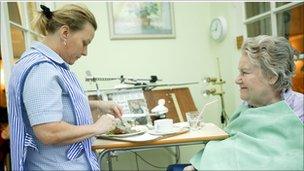Care Quality Commission has shortage of inspectors
- Published

Serious concerns have been raised over the care industry
England's care home regulator has a staff shortage of nearly 300, including some 133 inspectors, it has said.
The Care Quality Commission (CQC) has 283 unfilled posts in its workforce, including inspectors whose job it is to ensure care homes meet standards.
It blamed a recruitment freeze imposed by the Government last year - but the Department of Health said it relaxed the curb in February.
Charities have expressed concern at news of the shortfall.
Shadow health and social care minister Emily Thornberry said she wrote to Health Minister Paul Burstow on Friday to ask for an independent inquiry into whether the CQC had sufficient powers and resources.
"It's a matter of great concern that, at a time when the work of the CQC is set to increase sharply and when care services are under such stress as a result of government cutbacks, that it can be 133 inspectors short," she added.
News of the shortfall, initially reported by the Financial Times, external, comes after serious questions were raised over the care industry, as abuse at the Winterbourne View home for learning disabilities sufferers and financial problems at Southern Cross care homes came to light.
Southern Cross, Britain's largest care home provider, has delayed rent payments to its landlords in an effort to fend off bankruptcy.
Secret filming by BBC Panorama, broadcast on Tuesday, found a pattern of serious abuse at Winterbourne View.
'Unreserved apology'
The regulator said that following an internal review it recognised that "there were indications of problems at this hospital which should have led to us taking action sooner".
It offered an "unreserved apology" after admitting it failed to respond to at least two warnings from a former nurse at the centre in Bristol.
The Government has ordered a report into the abuse.
An inspector working for the CQC has told the Daily Mail the regulator was understaffed and unable to make the necessary inspections., external
The inspector said checks on hospitals had been sidelined and the CQC was "completely hampered by bureaucracy and red tape".
Fully accountable
Mark Milton, chief operating officer of the National Autistic Society, said: "We are extremely concerned that there have been 70% fewer inspections of adult care services in the past year, which may be partly attributable to a lack of inspection staff.
"The horrifying abuse uncovered by Panorama shows a clear need for robust regulation, as well as high-quality commissioning and the development of a culture within organisations of zero tolerance of abuse.
"We are calling on the government to ensure that the CQC is properly resourced to provide a fully accountable regulatory system that protects the vulnerable people that we all trust in them to support."
David Congdon, head of campaigns and policy at Mencap, said: "The government must look at investing money into the sector to ensure the safety and quality of life of some of society's most vulnerable."
A spokeswoman for the Royal College of Nursing said the CQC needed to demonstrate it was a "robust regulator with real teeth".
"Clearly it has some urgent work to do to make certain that it can fulfil this important role - and this includes the proper resources to enable it to deliver," the spokeswoman added.
The CQC said its inspection rate had fallen while it assessed care providers as part of a new system - but they were now on the rise again.
It said it was "committed" to effective regulation.
A spokeswoman said: "The CQC has had a recruitment freeze imposed on it after the election which has only just been raised and we are beginning to recruit frontline staff."
A Department of Health spokesman said the recruitment freeze was relaxed in February and it approved the recruitment of 75 inspectors in October
"The hiring of inspectors and staff is the direct responsibility of the CQC," a spokesman added.
- Published1 June 2011
- Published1 June 2011